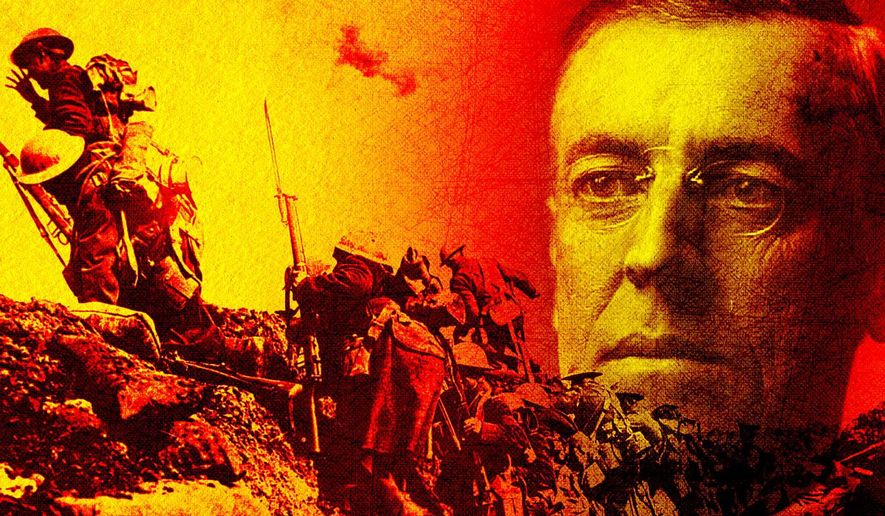OPINION:
As a college undergraduate some decades ago, I was assigned an essay on the three most evil men of the 20th century. Adolf Hitler, Vladimir Lenin, Joseph Stalin and Mao Zedong were obvious choices, and most of my fellow students chose from that group. I agreed on Hitler and Lenin, but felt that Stalin and Mao were just additional manifestations of the evil Lenin embodied. My third choice was Woodrow Wilson, which upset my professor at the time, but which I stand by today.
The Nazis and the Soviet Empire are gone and while meager bands of the admirers of both survive to inhabit steamy corners of various ideological swamps, the evil for which Hitler and Mao were responsible died with the last century. Woodrow Wilson’s legacy, however, simply won’t go away. Schools and think tanks are named for the man and various polls continue to rate him as a great or near-great president. The “progressive” politics of today’s Democrats are part of his legacy, as is the instability of much of the world in which we live.
Wilson, the first college president to occupy the White House, banned blacks from government restrooms, was the first president to openly attack the U.S. Constitution and eagerly support laws to prosecute and imprison those who disagreed with his policies. His hostility to black Americans was matched only by his antipathy toward Italian, German and Irish Americans and his desire to rid the nation of those he referred to dismissively as “hyphenated Americans” and against who he railed incessantly.
All of this is worth remembering as we observe the 100th anniversary of America’s entry into what was known until Pearl Harbor as the “Great War.” The last veterans of that conflict have passed on, but anyone looking back on it must conclude that it was indeed the “Great War,” not merely because of the dead and wounded it left in its wake, but because the world we live in today was shaped by the war that raged from 1914 until 1918 and the “peace” that followed.
The Great War was the world’s first truly global conflict and the first industrial war. The men recruited and drafted into the armies of Europe were cannon fodder doomed to die in the trenches of Europe, the plains of Russia and the mountains of Italy. Riflemen and cavalry were replaced by machine gunners, massed artillery and poison gas. It set the stage not just for the World War II, but for much of what followed both. The war brought us Lenin and the peace produced Hitler. The borders agreed to in Paris in 1919 led to instability in Europe, the Balkans and the Mideast, and remain at the heart of conflicts that have claimed millions of lives since.
Much of this was the fault not of Germany’s Kaiser Wilhelm or a Serbian assassin, but of the machinations of an American president who stumbled around after the war making demands that could never be fulfilled and left a legacy with which we are still living. The U.S. decision to enter the war may have made matters worse rather making the world safe for democracy. Britain’s Winston Churchill, who was all for it at the time, looked back later and in 1936 told a New York reporter, “If you hadn’t entered the war the allies would have made peace with Germany in the spring of 1917. Had we made peace then there would have been no collapse in Russia followed by Communism, no breakdown in Italy followed by Fascism, and Germany would not have signed the Versailles Treaty, which has enthroned Nazism in Germany.”
Here at home, Wilson’s war gave birth to a larger and larger role for government and regimentation. With the passage of the Espionage Act in 1917 and the Sedition Act a year later, Wilson had the power to ban dissent and shut up his critics. More than a hundred journalists including, most famously, socialist leader Eugene Debs, were indicted, tried and convicted for what they said and wrote rather than for anything they did. Even Mitchell Palmer, Wilson’s attorney general, who is remembered mainly for the Palmer raids launched as part of the “Red Scare,” felt after the war ended that his boss had gone too far. He went to the president and urged him to pardon Debs and the others lest history condemn him for his actions. Mr. Wilson tore up the pardon request, declaring, “This man was a traitor and he will never be pardoned during my administration.”
He wasn’t. Wilson’s successor, Warren Harding, commuted Mr. Debs’ sentence along with the others so cavalierly locked up by Mr. Wilson while he occupied the White House, but Palmer shouldn’t have worried. Wilson has never been as roundly condemned as he deserved because the history of what he did has been written by his progressive disciples.
• David A. Keene is editor at large at The Washington Times.




Please read our comment policy before commenting.